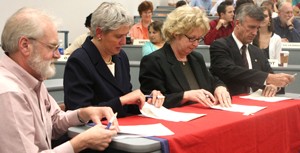Faculty expressed concerns over the UA Transformation Plan’s upcoming deadlines during the monthly UA Faculty Senate meeting, the last before the initial white paper proposals are due on Oct. 13.
“”I understand that the transformation is the issue on campus right now,”” said Robert Mitchell, vice chair of the faculty senate, “”which is why I have allotted . . . time to speak about it.””
Members of the senate were given 30 minutes to discuss the issues facing all affiliates of the university as a result of the transformation. Many of the issues concerned the availability of information, the role of students and the constriction of time in determining an acceptable transformation proposal.
“”Our goal has been to communicate as much as possible as soon as possible . . . and to create a world-class university,”” said Provost Meredith Hay.
Hay’s address of the transformation at the James E. Rogers College of Law focused on departmental efficiency, primarily which were strongest in making the university world class and which should be consolidated.
The Strategic Planning and Budgeting Committee, comprised of UA affiliates – including presidents and professors – will review the initial proposals.
SPBAC will have two weeks to review the proposals before making any decisions, Hay said.
This time frame raised concerns among members of the faculty senate, many of whom said they felt it to be inadequate. “”How in the world can we get consensus in such a short period of time?”” asked Wanda Howell, chair of the faculty.
“”I cannot predict how this will go,”” replied Miranda Joseph, chair of SPBAC and professor of women’s studies. “”I expect quite a large number of proposals. I don’t know how to answer these questions on time frame; the time frame is insane.””
President Robert Shelton attempted to ease the senate’s concerns.
“”Faculty are coming into the process at an early stage, in many ways. At this early stage, it may not be the last opportunity for proposals,”” Shelton said.
In addition to time constraints, several senators expressed concerns over the lack of available knowledge and the management of the university’s proposals. Marlys Witte, senator-at-large and professor of surgery, believed that lack of information was an imperfection in the system and resulted in specific colleges affected by the proposals being under-informed.
“”Too little faculty involvement is a habitual thing,”” said Glenn Songer, senator-at-large and professor of microbiology. “”There has been too little management and heavy-handedness.””
While the well-being of students has been generally discussed less than the transformation’s effect on faculty in past forums and town hall meetings, there was a notable mention from ASA member Kendal Nystedt, a political science senior.
“”I would like to request opportunities to get students involved,”” Nystedt said. “”Students are talking about this as much as anyone.””
Apart from the actual transformation proposals, the faculty senate did indirectly respond to issues regarding the overall financial situation of the university.
Ryan Paul, an English and women’s studies graduate student, expressed concerns to the senate regarding the quality of education and the potential consolidation of departments. Paul, though only allotted two minutes, raised the issue of educational funding and support in smaller areas and departments, as opposed to the larger and more popular ones.
In addition to this, the faculty discussed the possibility of getting students to graduate under the four-year plan by setting a minimum number of credits for each semester. The initial proposition mandated that students must take at least 15 credits each semester. This proposal came in opposition to other plans to facilitate four-year graduation, including raising the number of credit hours per class. The senate did not come to any conclusions regarding the plan but is discussing it as a result of the UA’s current financial situation.









